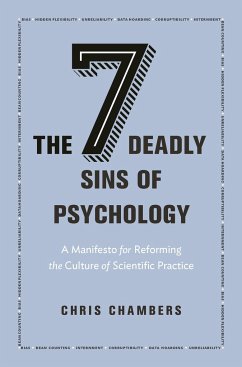In this unflinchingly candid manifesto, Chris Chambers draws on his own experiences as a working scientist to reveal a dark side to psychology that few of us ever see. Using the seven deadly sins as a metaphor, he shows how practitioners are vulnerable to powerful biases that undercut the scientific method, how they routinely torture data until it produces outcomes that can be published in prestigious journals, and how studies are much less reliable than advertised. He reveals how a culture of secrecy denies the public and other researchers access to the results of psychology experiments, how fraudulent academics can operate with impunity, and how an obsession with bean counting creates perverse incentives for academics. Left unchecked, these problems threaten the very future of psychology as a science - but help is here.
"This book could change how science is done. The issues Chambers raises are starting to be taken very seriously, especially by major funders in the United States and beyond, because of concerns that current practices are wasting resources by fostering irreproducible research. This is the only book I know of that is addressing these issues head-on." - Dorothy Bishop, University of Oxford








